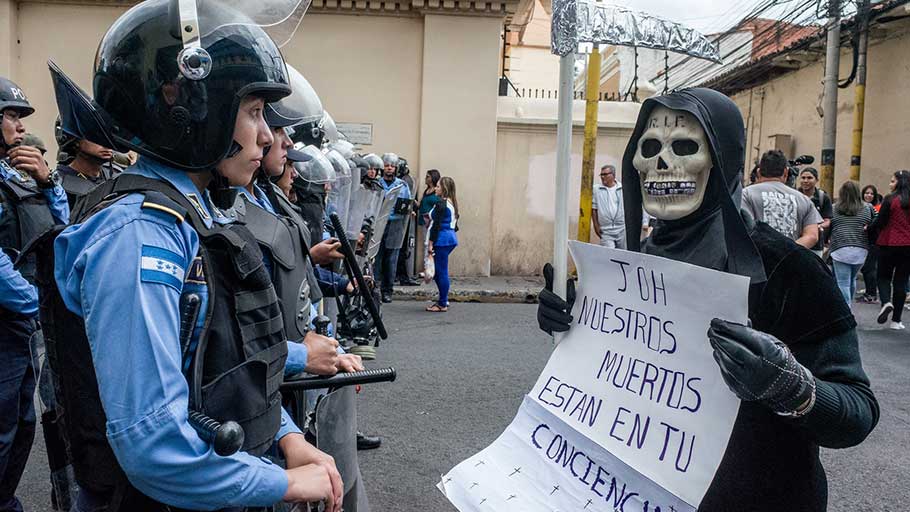A woman dressed as death stands in front of Honduran security forces during protests in the capital, Tegucigalpa, with a sign that reads, “JOH (Juan Orlando Hernández) our deaths are on your conscience.” All photos by author unless otherwise noted.
Migrants are leaving not only because they fear gang violence, but because they are terrified of the brutal government.
Nineteen-year-old taxi driver Diego is not interested in politics. But his hometown of El Progreso—a transit hub in central Honduras, where everyone seems to have a friend or relative who has “gone north” to the US—has long been a hotbed of popular resistance. In 1954, workers here launched a 69-day strike that challenged the United Fruit Company and briefly brought the country to a political and economic standstill.
In November 2017, it was allegations of fraud in the country’s recent presidential election that drew demonstrators to the streets. On one of those days, Diego dropped a passenger near where anti-government protests were slated to take place. He had been driving his taxi all morning and decided to take a break and check out the action nearby. Moments after he got out of his car, Diego found himself in the path of a phalanx of Honduran security forces marching through a cloud of tear gas. Before he could process what was going on, they began firing live rounds into the crowd. A bullet struck Diego’s lower leg as he ran away. (VICE has changed names and certain details to protect the identities of Diego and his family.)
Diego’s older brother Raúl was participating in the protests, and took Diego to the hospital, where they found medical staff overwhelmed by an influx of people in need of emergency care. As they waited outside, a police patrol arrived and began accusing injured protestors of being gang members. “They tried to drag us into their cars and threatened to take the phones of anyone who tried to film them,” explained Raúl. It was only after doctors intervened that the police relented. “I don’t think they would have taken us to jail. I think we would have disappeared,” he continued. “That’s how they silence you.”
“They,” in this case, are the security forces that answer to Honduran President Juan Orlando Hernández, an impeccably coiffed Latin American politician straight out of central casting. His pro-business, World Bank and International Monetary Fund–approved vision for Honduras, combined with his preference for a militarized approach to the war on drugs, has made him a favorite within certain US policy circles. The country has received more than $70 million in security assistance from the US since his election in 2014, according to data collected by the Center for International Policy. When President Donald Trump’s current chief of staff, John Kelly, served as head of the US military’s Southern Command during the Obama administration, he praised Hernández for his record on human rights, anti-corruption, and tackling drug trafficking.
Human rights and anti-corruption groups have documented just the opposite. The organization Human Rights Watch, for example, describes Honduras under Hernández as a place where “impunity for crime and human rights abuses is the norm.” A two-year investigation by watchdog group Global Witness concluded that Honduras is the deadliest country in the world for environmental activists, writing in 2017, “Nowhere are you more likely to be killed for standing up to companies that grab land and trash the environment than in Honduras.” Even the normally measured Carnegie Endowment for International Peace has gone so far as to label Honduras a country where “corruption is the operating system” and “repression is carefully targeted for maximum psychological effect.”
Several members of Hernández’s National Party, including the son of his like-minded predecessor, have been implicated in drug trafficking. Last year, a leader of the Cachiros, a drug cartel that specialized in transporting Colombian cocaine through Honduras, testified in a New York court that Hernández’s brother was directly involved in their operations.
That deadly political climate has contributed to anti-government protests, as well as the decision by at least 350,000 Hondurans in the last ten years—including at least 52,000 unaccompanied minors in the last five—to make the perilous journey through Guatemala and Mexico in order to reach the US. Those numbers are conservative estimates provided to VICE by Stephanie Leutert, the director of the Mexico Security Initiative at the University of Texas, who tracks migration trends in the region.
Among those who have left are Hondurans in the caravan of a few thousandmigrants currently making their way through Mexico to the US border, enduring brutal conditions and suffering under rain and hot sun with little protection. “It’s even worse in Honduras,” one mother of four in the caravan told VICE News earlier this week.
Much of the narrative about why so many Hondurans risk everything to migrate focuses on astronomical homicide rates and gang violence perpetrated by groups like Mara Salvatrucha, known as MS-13, and a similar gang called Barrio 18. While those arriving in the US are indeed often fleeing gang activity, and young people deported back to Honduras do risk forced recruitment or becoming victims, gang violence is only one part of the broader system that drives people to leave their homes.
Interviews in Honduras with close to 40 human rights and environmental activists, lawyers, opposition leaders, citizens in hiding, and friends and family of those who have disappeared or been assassinated tell a much more complicated, disquieting story of why people leave. In the last nine years, Honduras has morphed into something that defies neat categorization: a narco-kleptocracy of sorts, operating under the guise of privatization and deregulation, where politicians, business elites, and organized crime oversee a system of governance predicated on corruption, violence, and impunity in order to enrich themselves and terrorize their opponents.
And at almost every turn, this system has been enabled and at times encouraged by the US government.
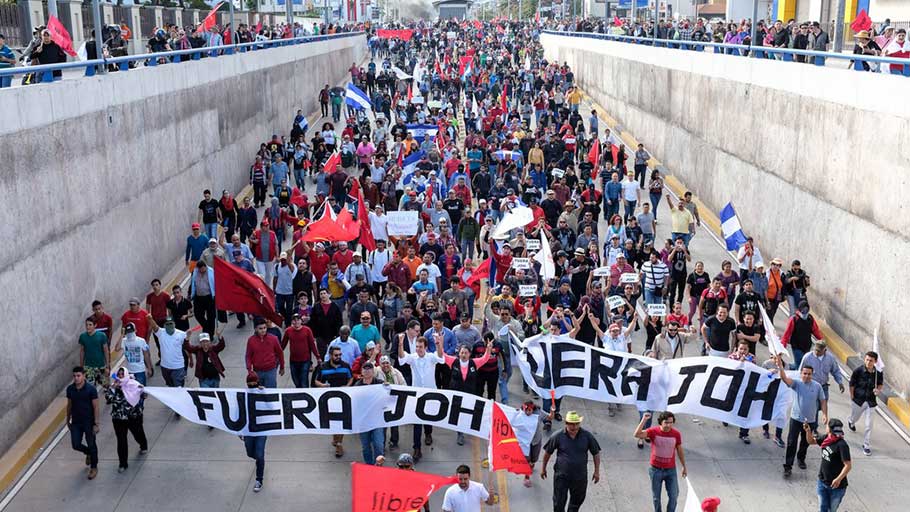
Anti-Hernández protesters in Tegucigalpa.
In the run-up to the November 2017 presidential election, few thought that Salvador Nasralla, a sportscaster and TV personality tapped by a coalition of opposition parties to run under the banner of anti-corruption, could pose a serious challenge to Hernández. Yet early returns on election day, November 26, indicated that he was poised to pull off the upset.
When Nasralla appeared to be pulling away, holding a 5 percent lead with 70 percent of the vote reported, the country’s electoral commission, mostly staffed by Hernández appointees, decided to stop broadcasting the tabulations altogether.
A 36-hour blackout of voting results ensued, and amid the controversyHonduran security forces resorted to tear gas, live ammunition, and arrests to crack down on protestors and impose a curfew. José Luis Ortiz had never been involved in politics before because “they are all equally corrupt,” but he was one of the tens of thousands of Hondurans who took to the streets to protest. “We knew they wanted to steal the elections and they did,” Ortiz explained from the courtyard of his family home in El Progreso. “That’s why I decided to protest, out of conviction.” At the end of that evening, Ortiz would find himself fighting for his life in an emergency room after Honduran security forces fired a tear gas canister into his face from a distance of less than ten feet.
When publication of the results resumed and as votes continued to trickle in, it was Hernández who suddenly—and improbably, according to local and outside experts—held a slim but insurmountable lead.
The election commission declared Hernández the winner. The opposition cried foul. Election monitors from the European Union and Organization for American States (OAS) identified several irregularities, the latter calling for new elections, citing “deliberate human intrusions in the computer system” and clear indications of vote tampering.
In the weeks that followed, the Committee for the Relatives of the Disappeared, a human rights organization known by its Spanish acronym COFADEH, documented a major uptick in political violence: 30 assassinations, 232 wounded or injured, and over 1,085 detained, in addition to people who had been displaced, gone into hiding, or disappeared.
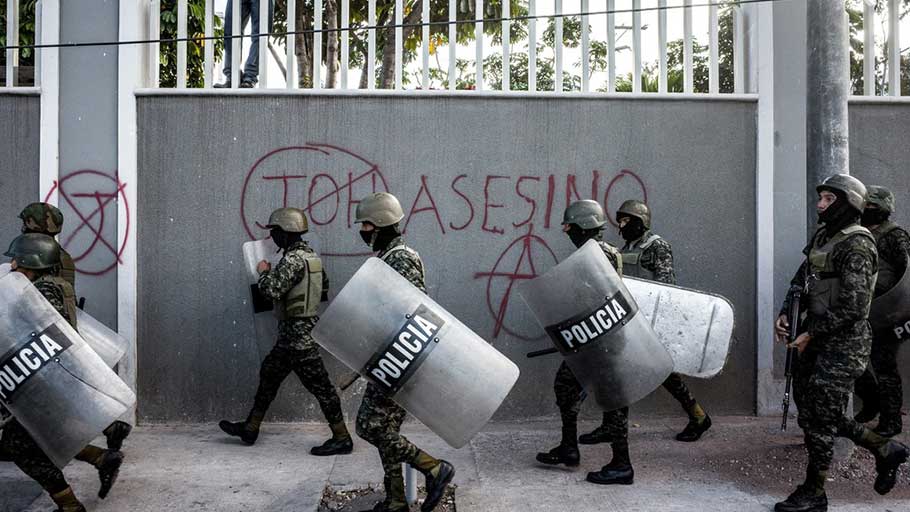
Government forces in Tegucigalpa.
When I met with Diego and Raúl in their family home in February, Diego was still in a cast so that his torn tendons and bone fractures could heal. He sat despondent and clearly traumatized, only muttering a few words. His grandmother said they have not filed a formal complaint with the government. “We are too scared because the repercussions will come,” she said.
According to Raúl, the only option is for the family save several thousand dollars to hire a coyote—a smuggler—to take Diego to the US. “He can’t stay here. The police have all his information,” he explained. “So, we are just waiting for him to recover and to get him out of the country as soon as possible.” Hopefully Diego can make his way to Tennessee, where their mother has been living as an undocumented immigrant for eight years.
Applying for asylum while still in Honduras, the family says, is not a viable option. “The formal processes take too long and it is too dangerous to wait. That’s the reality,” Raúl said, explaining that collecting evidence to prove they are at risk is too dangerous as it would likely draw the attention of the authorities. As Raúl offered his thoughts on the situation, a local lawyer who wanted to hear the family’s story nodded along, providing unspoken acknowledgement that Raúl’s assessment is spot on.
“We can’t see any way out other than going illegally,” Raúl concluded.
Despite the widespread allegations of fraud and calls for a new vote, the US State Department decided to recognize Hernández as the winner of the 2017 election, even as it acknowledged the irregularities identified by the EU and OAS. For human rights activists who have been systemically targeted throughout the Hernández presidency, the US endorsement was a predictable, if demoralizing, outcome.
“If this had happened in Venezuela, there would have been an intervention. But because it happened in Honduras, a country of servitude to their [US] interests, they say, ‘Well, you know, there were irregularities, but these things happen,’” said Bertha Isabel Zúñiga Cáceres.
Zúñiga Cáceres’s mother, the world-renowned environmental activist Berta Cáceres, was assassinated two years ago inside her home. A team of international lawyers concluded that state agents and high-ranking business executives were involved in the planning, execution, and subsequent coverup of her murder, but two and a half years and several delays later, those accused of her murder have yet to face trial.
“They (the US) want to keep a stability that is actually nonexistent in this country,” Zúñiga Cáceres said from the small office in the town of La Esperanza, where she carries on her mother’s legacy of environmental activism.
For Salvador Nasralla, who went to bed on election night believing he could be the next president of Honduras, the motives behind US support for Hernández are obvious.
“They know that Juan Orlando Hernández is a bad guy,” Nasralla said, a day after a previous interview was cut short amid tear gas en route to the stadium where Hernández was being sworn in for his second term. “He is a person who abides by the US because the United States keeps a tight grip on him. So, the US uses the old logic: This man is a bad guy, but he is our bad guy.”
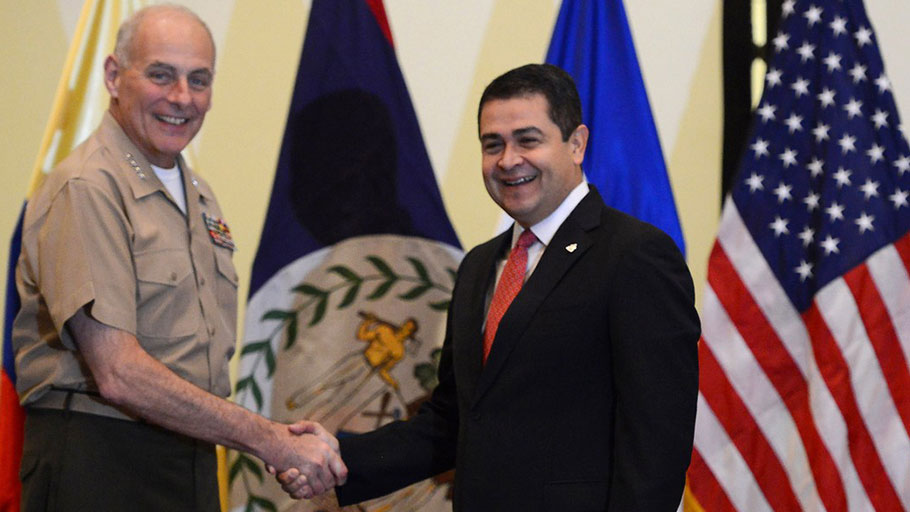
Juan Orlando Hernández shakes hands with General John Kelly, now the White House chief of staff, in 2015. Photo by Orlando Sierra, AFP, Getty
From sponsoring coups on behalf of US business interests in the first half of the 20th century to funding proxy wars and death squads during the Cold War, the United States has worked with its fair share of anti-democratic forces in Central America. And while the justification and rationale behind US involvement in the region are still widely debated in policy circles, few could deny that the current trajectory of Honduras is inextricably linked to US foreign policy.
When Bertha Oliva helped found the aforementioned COFADEH in the 1980s, it was in response to 182 persons who had been forcibly “disappeared” by the Honduran military between 1980 and 1982. Among those who disappeared was her husband, Tomás Nativí, who spoke out against the US-supported military government.
Nativí also denounced the presence of US military forces in Honduras, who used the country in the 1980s as a staging ground from which it could coordinate its efforts to combat left-wing insurgencies throughout the region. Even today, Honduras remains a country where, to quote State Department official Tom Shannon, writing in a 2009 diplomatic cable urging a coordinated US response to the coup, the US has “big military equities.”
Oliva has been fighting for human rights, and receiving death threats and harassment because of it, ever since she started seeking justice for her husband’s disappearance. Her life’s work is, in many ways, devoted to documenting the repercussions of US interventions that she said “linger and haven’t left.”
Even MS-13, which the Trump administration constantly cites as a reason to block Central American asylum seekers from entering the US, is an American export. Journalists who have studied the group closely, such as Óscar Martinez and Iaon Grillo, trace MS-13’s roots to Los Angeles in the 1970s, when immigrant teens from El Salvador, trying to carve out their own identity among other immigrant populations, began smoking weed and listening to rock music together. The group transformed into a criminal outfit in the 1980s amid an influx of Salvadoran immigrants fleeing a brutal civil war between the US-backed Salvadoran military government and a coalition of left-wing guerrillas.
Although a parallel MS-13 presence existed in El Salvador, it was only until the 1996 Illegal Immigration Reform and Immigrant Responsibility Act, which resulted in the deportation from the US of tens of thousands of documented and undocumented immigrants with criminal records, that MS-13 and Barrio 18 became international phenomena, spreading to other countries in Central America, including Honduras.
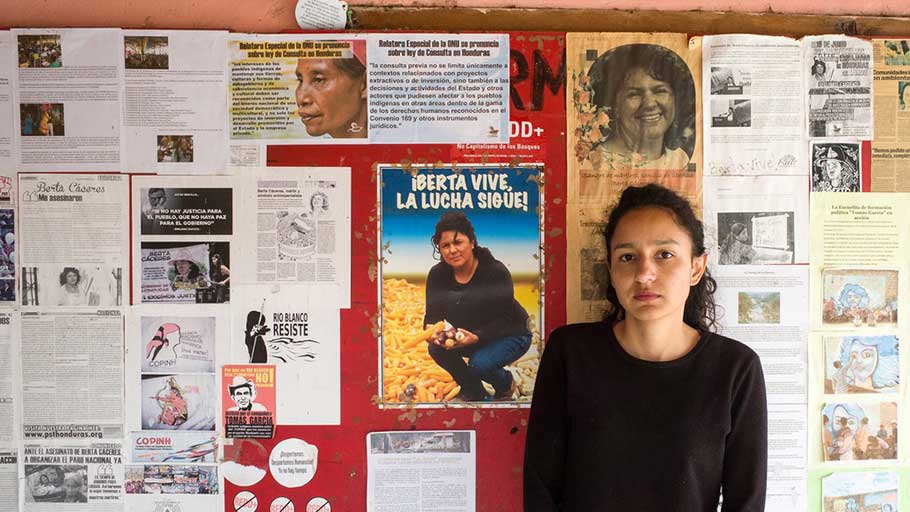
Bertha Isabel Zuñiga in her office.
In 2006, Hondurans elected Manuel “Mel” Zelaya president. Despite being elected as the candidate of the center-right Liberal Party, he embarked upon an ambitious and unapologetically progressive agenda while in office. He raised the minimum wage, increased subsidies to farmers, guaranteed free schooling to Honduran children, and expanded access to healthcare. Although his administration stood accused of corruption and mismanagement of public funds, Zelaya’s poverty reduction programs represented a glimmer of hope for many Hondurans who had been on the on the losing end of the privatization and structural adjustment policies that had defined the previous two decades.
Zelaya’s leftward turn drew the ire of Honduran business elites, and his decision to join the Venezuelan-led Petrocaribe oil alliance—along with suggestions that the US military presence be reconsidered—spooked the Latin American right and its North American allies. His presidency was cut short when the Honduran military showed up at the presidential palace one morning, arrested him, and flew him to neighboring Costa Rica, stopping to refuel at the Soto Cano air base, where 600 US troops were stationed. The military tried to justify the kidnapping and forced exile of its own president by claiming that Zelaya was planning to change the Honduran constitution to run for a second term.
Zelaya had indeed called for a non-binding poll to determine whether the single term limit should be put to a vote, but his defenders maintain that holding such a poll hardly constitutes a power grab.
The Obama administration, along with other governments in the region, condemned the coup and called for the military to reinstate Zelaya as the head of state. Yet the Honduran military, and the elites who supported the coup, held firm and with time, various actors within the US government began warming to the idea of keeping Zelaya out of power.
Leaked diplomatic cables have since confirmed that Honduran military officials, despite being sanctioned by the US, were able to leverage their contacts within the Pentagon and the US military establishment at the time. Meanwhile, Honduran political and business elites quietly lobbied Republican lawmakers. These behind-the-scenes efforts succeeded in eventually bringing the State Department around to the idea that the military and de facto government should be allowed to hold elections while Zelaya was still in exile.
In her memoir, Hard Choices, then Secretary of State Hillary Clinton writes of the process, “We strategized on a plan to restore order in Honduras and ensure that free and fair elections could be held quickly and legitimately, which would render the question of Zelaya moot and give the Honduran people a chance to choose their own future.” This passage, a tacit confirmation that US policy marginalized Zelaya and helped clear the path for Honduran military and business elites to regain power, was removed from the paperback edition of the book—as were the surrounding passages concerning the coup—as Clinton prepared for her presidential run.
The new Honduran government began reversing the social gains made under Zelaya and implementing its own agenda predicated on privatization and budget cuts. It also began eroding institutions, most notably replacing four members of the Supreme Court with right-wing National Party partisans.
In 2015, news broke that government officials connected to the National Party embezzled hundreds of millions from the Honduran Institute of Social Security, leaving the public health system in ruins. Researchers subsequently estimatedthat close to 3,000 people may have died as a direct result. As investigations into the social security scandal continued, Juan Orlando Hernández publicly admitted that companies tied to the looting of state coffers had directly contributed to his presidential campaign, though he denied he had knowledge of the source of the money at the time.
Despite mass protests and calls for him to resign, Hernández managed to come out of the scandal relatively unscathed, and US aid dollars continued flowing in, even as the vice president and several high-ranking officials were forced to resign amid a wide range of scandals.
The National Party’s gutting of state institutions also allowed Hernández to do the very thing that the military had accused Zelaya of trying to do six years prior: run for re-election. In April 2015, the Supreme Court voided the single-term limit outlined in the constitution.
 Hernández’s reelection all but guarantees the system of looting and self-enrichment will continue, with business interests and organized crime working with the government to threaten, and even kill, those who stand in their way.
Hernández’s reelection all but guarantees the system of looting and self-enrichment will continue, with business interests and organized crime working with the government to threaten, and even kill, those who stand in their way.
When Berta Cáceres was assassinated in 2016, her murder drew worldwide condemnation, and independent investigators alleged that her assassination was planned and executed by individuals with ties to the Honduran military and DESA, the private company whose hydro-electric projects Cáceres had spent years protesting. Two and half years after her murder, the men arrested in connection with her murder are yet to face trial.
But it is not just movement leaders like Cáceres who are targeted for assassination. Since the coup in 2009, human rights organizations have documented over 130 assassinations of environmental activists.
Days after Cáceres was murdered, Nelson Garcia, who was also a member of Cáceres’s organization, COPINH, was killed leaving his home. According to Garcia’s mother, when she arrived at the crime scene one of the police officers asked her if she knew her son was involved with COPINH. She nodded in the affirmative. “Then you must know where the death is coming from and why,” the police officer continued, before going back inside his air-conditioned car to listen to music.
For those who wanted him dead, however, killing Garcia was not enough. His wife and children were constantly threatened by gang members after his murder and have successfully sought asylum in the US, making them a relative rarity. Despite the systemic violence and government oppression, Honduras ranks fourth-highest in denial rates for asylum seekers to the US, with 78 percent of claims rejected.
Garcia’s family in Honduras still faces harassment from those determined to send a message to future activists, including threats over the phone and at least one case in which someone attempted to shoot his uncle while he was tending his fields.
In February, I met with peasants, or campesinos, in the Bajo Aguán region, where entire communities are living in squalor after they were violently displaced by World Bank–supported development projects devoted to agribusiness. Community members took turns telling me about friends and family who have been murdered or disappeared. Sometimes it is Honduran security forces firing tear gas and live rounds into their encampments situated deep within the jungle of palm oil plantations. Other times, its paramilitary groups and gang members hired to do their bidding.
“If they are going to kill me because of it, fine, they can kill me. I have lived a life of suffering, not joy. I haven’t felt joy,” said Sofia Baquedano, an elderly woman who is a part of the campesino resistance in a village called Panama. Baquedano and her comrades are protesting an African palm oil plantation they say Dinant came to control via an illegal land-grab. “No medicine, no food, no roof over our heads. The only thing that Juan Orlando [Hernández] gives us is gas and bullets,” Baquedano said, pointing to the military compound only a few hundred meters in the distance, which is embedded within the Dinant palm oil plantation. When I approached that Honduran military installation to request an interview with whomever was authorized to speak, one soldier quipped to another that perhaps my colleague and I “wanted lead.” Subsequent requests to interview the Honduran military or government officials went unanswered.
According to Panama community members, trying to reclaim their land through occupation is the only option at their disposal. Their organization is named after Gregorio Chavez, a local preacher who denounced Dinant corporation before he was kidnapped, tortured, and brutally murdered. Legal challenges have either gone nowhere or been ignored.
Another community in the Bajo Aguán, called Trinidad, made some progress taking their fight to the courts, but as soon as decisions started going their way, their lawyer, Antonio Trejo Cabrera, was assassinated as he was leaving a wedding in Tegucigalpa. “They can take away our lawyers but they can’t take away our people,” said Walter Calcemo, one of the campesinos trying to reclaim land given to agribusiness in the Bajo Aguán. “We are a stone in their shoe.”
Yet the reality is that not everyone shares the same defiance as Baquedano and Calcemo, who seem prepared to continue their fight against the government and its business allies indefinitely. As members of their communities continue to disappear or turn up dead, many young people have decided that “going north” to the US, the very country that lends an imprimatur of legitimacy to the system that oppresses them, is the only viable path to a different future.
“There used to be a lot more of us here,” Calcemo lamented, pointing to the tents and benches that comprise what is left of their encampment. “Many of the young people are gone. There is nothing left here for them.”

